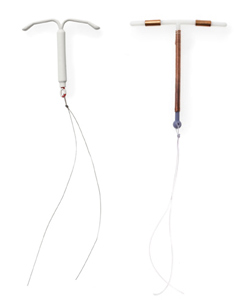Mirena IUD
The Mirena intrauterine device (IUD) is manufactured by Bayer Pharmaceutical Company and is marketed as a safe, effective form of birth control. The Mirena IUD is a T-shaped device that is inserted into a woman’s uterus, and through the slow release of hormones is effective as a birth control option for up to 5 years.
 Mirena was approved by the FDA for sale in the U.S. in the early 2000’s and has become increasingly popular since then. In addition to its use as a form of birth control, Mirena has also been approved by the FDA for treating heavy menstrual bleeding in patients. Although Mirena has many positive uses, Mirena can also cause dangerous side effects.
Mirena was approved by the FDA for sale in the U.S. in the early 2000’s and has become increasingly popular since then. In addition to its use as a form of birth control, Mirena has also been approved by the FDA for treating heavy menstrual bleeding in patients. Although Mirena has many positive uses, Mirena can also cause dangerous side effects.
Mirena has been known to cause cysts on the ovaries, abdominal pain, depression, and, in some cases, pelvic inflammatory disease or even perforation of the uterus. Though Bayer has said that the dangerous side effects are about the same percentage (usually 1-3% of patients) as those taking birth control pills, some government agencies believe Bayer has misled the public.
In 2009, Bayer was instructed by the Department of Health and Human Services to change their marketing campaign (called their “Busy Moms” campaign) because it was misleading. The campaign was considered misleading because Bayer would send a nurse practitioner to house parties, and would suggest that using Mirena could help the women become more intimate with their spouses, as well as, look and feel great.
The Department of Health and Human Services made the argument that common side effects of Mirena, including headaches, nausea, and abdominal pain actually do the opposite of making the patient look and feel great or be more intimate. Statements were also made by these parties about how Mirena does not require a monthly routine, unlike other birth control options. The Department of Health and Human Services argued, however, that these claims are misleading because Mirena actually requires the user to make monthly checks to ensure the device is still in place.
The FDA has also made Bayer change its label more than once, due to them finding it to be incomplete with regards to the possible side effects Mirena may cause. To date, the FDA has received an estimated 70,000 adverse event reports regarding the side effects of Mirena.
If you or a loved one suffered cysts on the ovaries, abdominal pain, depression, and, in some cases, pelvic inflammatory disease or perforation of the uterus from using a Mirena IUD, contact the Merman Law Firm immediately for a free consultation.


